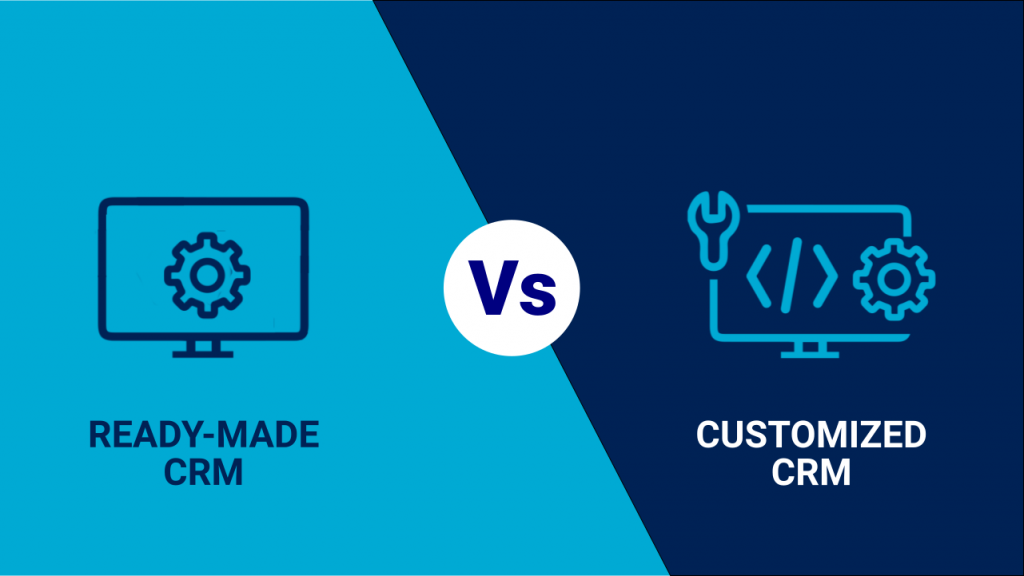As you are already aware of CRMs, here we will look at the features, pros & cons of opting for a readymade CRM vs customized CRM. If you don’t know what CRM is or how it helps your business grow, you can check out our previous post here.

How CRMs work
A CRM system stores customer information in a structured & organized manner. With modern CRMs, you get a lot of functionalities such as business analytics, reporting, automated messaging, reminders, appointments, etc. With an interactive user experience, CRMs make office processes smoother and easier.
A good CRM makes life easier for a business, especially its employees. Hence, a CRM must match your business needs and work according to your office processes.
CRM systems are of two types: Readymade and Customized. Further in this post, we’ll discuss how both work and compare the basic differences between a readymade CRM and a custom-built one.
Readymade CRM
Readymade CRMs are pre-designed and developed CRM software, mostly available as a pay-as-you-go or subscription model. These CRMs include all the basic tools & functions a business may need. Ready-to-use CRMs are great for small and mid-size firms with general work processes that do not require unique functionality. CRM providers often have flexible tariff plans. Some providers may offer a free version of CRM software to micro-businesses with low turnovers/users.
Customized CRM
Customized CRM is an excellent solution for businesses that have unique business processes. Just like any custom software, these CRMs are designed and developed by third-party developers. Compared to Readymade software, Customized CRMs require good capital investment.
Custom CRM offers an edge over readymade or pre-built CRMs, as you will have total control over the functionalities and features. It can modify or scale them per your needs. A customized CRM is great for large firms or those whose business processes differ from typical ones.
Side-by-side Comparison of Readymade CRM vs Customized CRM System
Below, you can find all the differences between both types of CRMs to understand better how they differ.
| Readymade CRM | Customized CRM | |
|---|---|---|
| Try before you use | Option to try the software system for free almost instantly to get an idea of how everything would work | No option to try anything for a very long time, until a large chunk of the system has been developed |
| Setup/Development Time | Quick setup time, ranging from a couple of minutes to a couple of days | Long development time, which may last from a couple of months to several months |
| Built for | Usually built commonly for a variety of businesses & industries | Specifically built as required by dictating the developers what suits your needs |
| Basic/Popular functionality | Basic & most popular functionalities come built-in | Even basic functionalities have to be created from scratch |
| Additional functionality | May provide tons of additional features which are not used. Required functionalities may have to be purchased as addons, requiring additional costs | All functionalities & processes are made as per requirements and hence can be used to maximise work efficiency. Doesn’t require major costs for adding functionalities |
| Quality Testing | Well-tested & bug-free, and hence trusted by lots of people | Testing has to be done after the completion of development. Has a high probability of having bugs & issues during the initial phases |
| Support | Qualified & trained support team to resolve issues | Need to rely on the development team for support, which may not be streamlined |
| Costs | Basic Monthly or Yearly recurring fees increases with the number of users. Additional recurring costs get added for additional functionalities that may be required | Large initial capital is required to start development but saves money in the long run as there are no recurring usage fees |
| Complexity | Systems may sometimes be too complex and require training & support to understand how to use them | Less chance of the system being complex as it is built specifically as per your needs |
| Information Security | Information is stored securely, but with a third-party | Information is stored securely with you and no-one else |
| Scaling | Can be scaled with some limitations, but costs can run very high | Can be scaled to add new features as per your needs without incurring a huge cost |
| Integration with other platforms/apps | Limited integration only as provided by the system providers | Integration with other apps or modules can be done to enhance the functionality |
| Updates | Regular free updates & bug fixes, as released by the provider | Updates & bug fixes have to be done by developers, which would incur some costs |
| Ownership | Owned by provider | Owned by you |
| Maintenance | Handled by the provider | Has to be handled by you or the developers |
Conclusion
You should choose a readymade CRM:
- If you are a small business with basic requirements
- If you can’t spend a fair amount of time & money on custom development
You should choose a Customized CRM:
- If you know what you want & it’s not available or it costs too much in readymade CRMs
- If you are a medium or large-scale business and can afford development time & costs
